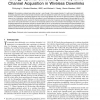Free Online Productivity Tools
i2Speak
i2Symbol
i2OCR
iTex2Img
iWeb2Print
iWeb2Shot
i2Type
iPdf2Split
iPdf2Merge
i2Bopomofo
i2Arabic
i2Style
i2Image
i2PDF
iLatex2Rtf
Sci2ools
103
click to vote
TMC
2010
2010
Energy-Optimal Scheduling with Dynamic Channel Acquisition in Wireless Downlinks
—We consider a wireless base station serving L users through L time-varying channels. It is well known that opportunistic scheduling algorithms with full channel state information (CSI) can stabilize the system with any data rates within the capacity region. However, such opportunistic scheduling algorithms may not be energy efficient when the cost of channel acquisition is high and traffic rates are low. In particular, under the low traffic rate regime, it may be sufficient and more energy efficient to transmit data with no CSI, i.e., to transmit data blindly, since no power for channel acquisition is consumed. In general, we show strategies that probe channels in every slot or never probe channels in any slot are not necessarily optimal, and we must consider mixed strategies. We derive a unified scheduling algorithm that dynamically chooses to transmit data with full or no CSI based on queue backlog and channel statistics. Our methodology is general and can be naturally extended to...
Related Content
| Added | 31 Jan 2011 |
| Updated | 31 Jan 2011 |
| Type | Journal |
| Year | 2010 |
| Where | TMC |
| Authors | Chih-Ping Li, Michael J. Neely |
Comments (0)

